Zombie Bunny is Reader-supported and may earn an affiliate commission through links on our site.

AI: The Backbone of Realistic PC Gaming
Experience the thrilling realism in PC gaming backed by AI. #AIRealism #ThrillingPCGaming
Experience the transformative journey of PC gaming through the lens of Artificial Intelligence (AI). This blog explores the evolution of AI from its rudimentary beginnings to its current role in crafting immersive, realistic gaming experiences. Discover how AI is revolutionizing game design through dynamic content generation, adaptive difficulty scaling, and sophisticated character behavior. Delve into the future of AI in gaming, with potential advancements promising more personalized and engaging gaming experiences. Whether you’re a casual gamer or a hardcore enthusiast, this blog offers a comprehensive look at how AI is shaping the future of PC gaming.
Introduction: Why AI Matters in PC Gaming
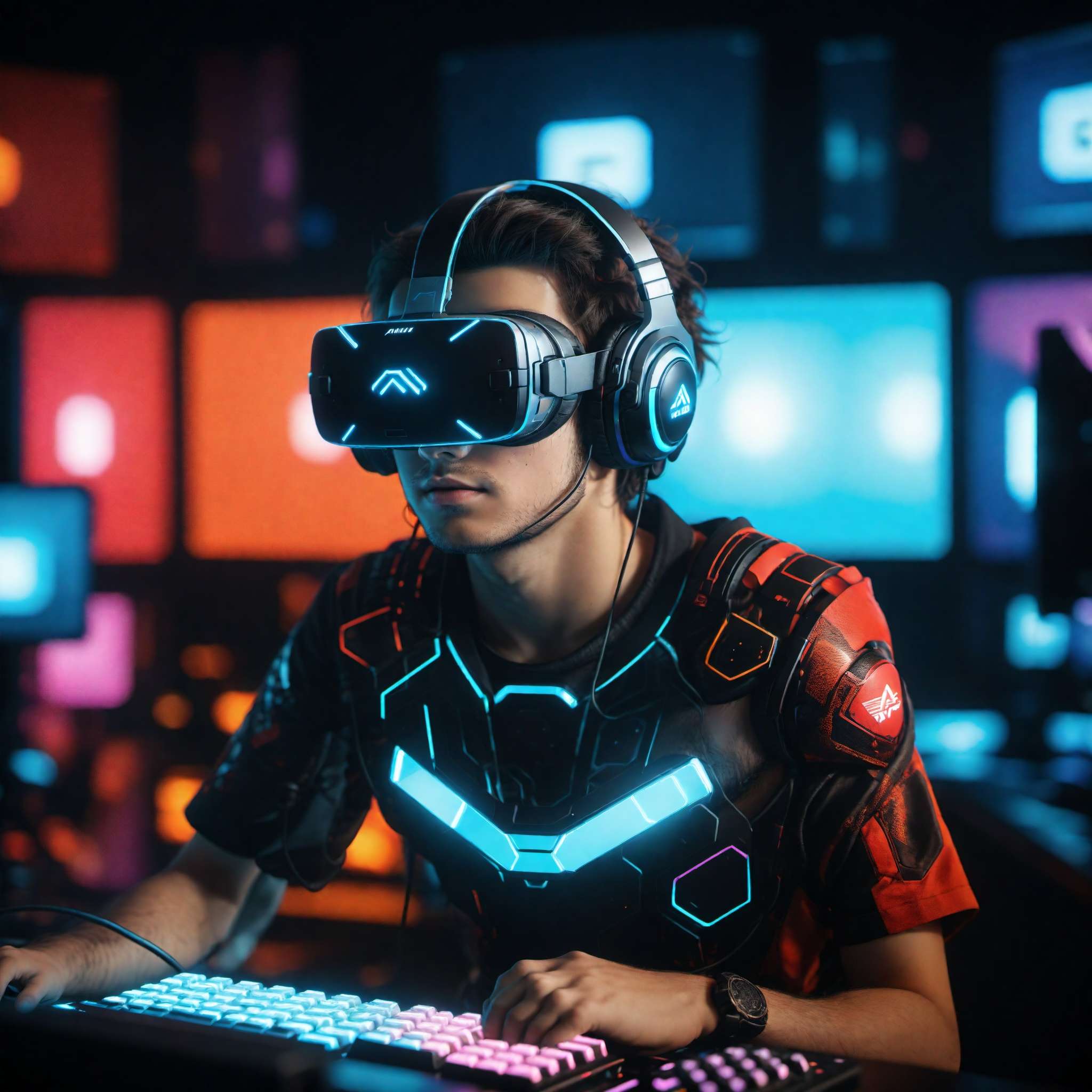
© Copyright , ZombieBunny.Org
Brief history of PC gaming
In the landscape of entertainment, the emergence and evolution of PC gaming has been a transformative journey. This journey began in the early 1960s with simplistic text-based games. These games, although rudimentary by today’s standards, marked a significant milestone in the utilization of computers for entertainment purposes. The 1980s and 1990s saw a significant transformation in PC gaming, with the introduction of more sophisticated graphics and sound effects, enabling a more immersive gaming experience. Games like Doom and Civilization set new standards for PC gaming, pushing the boundaries of what was thought possible.
The turn of the century brought with it a new era in PC gaming, marked by innovations in 3D graphics, online multiplayer modes, and advanced game physics. This period saw the advent of iconic games such as Half-Life, World of Warcraft, and The Sims, which revolutionized the gaming industry and set a new benchmark for future games. In the current era, PC gaming is characterized by high-definition graphics, immersive soundscapes, and intricate gameplay mechanics. The introduction of AI has further propelled the industry into uncharted territories, enhancing game realism and interactivity. As we look back on the history of PC gaming, it is evident that AI has been a game-changer, laying the groundwork for a more immersive and realistic gaming experience.
The role of AI in games
Artificial Intelligence (AI) has gradually infiltrated the realm of PC gaming, playing a crucial role in enhancing the overall gaming experience. Initially, AI’s role was limited to controlling non-playable characters (NPCs) and ensuring their basic interaction with the player. As the technology evolved, so did the complexity of these interactions, adding depth and realism to the gaming experience.
Today, AI’s function extends far beyond controlling NPCs. It is now responsible for creating dynamic and adaptive gaming environments, adjusting game difficulty based on player performance, and even generating game content. The intelligent systems can learn from player behavior, enabling games to become more challenging and engaging over time. AI has also facilitated the creation of intelligent enemies in games, capable of strategizing and adapting to the player’s tactics. This has allowed for more challenging gameplay and increased replayability. Furthermore, AI has been instrumental in enhancing game realism, contributing to more natural character behavior, realistic environmental changes, and sophisticated game physics. The role of AI in games is pivotal, and as the technology continues to evolve, it promises to revolutionize the PC gaming industry in ways we can only begin to imagine.
Modern day significance of AI in gaming
In the current era of PC gaming, the significance of AI has become more pronounced than ever. It’s no longer just about controlling characters or adjusting difficulty levels; AI is now at the heart of creating immersive and lifelike gaming experiences. With advancements in machine learning and deep learning, AI is able to understand and respond to player actions in real-time, making games more engaging and unpredictable.
One of the most notable applications of AI in modern gaming is in the realm of procedural content generation. AI is used to create vast and intricate gaming worlds that are dynamic and ever-evolving, offering a unique experience with each playthrough. This not only enhances the replay value of games but also adds an element of surprise and unpredictability that keeps players engaged.
Furthermore, AI is instrumental in creating intelligent and adaptable in-game characters. These characters can learn from the players’ actions, adapt their strategies, and present new challenges, making the gaming experience more immersive and challenging. AI is also used to create realistic physics and lighting effects in games, adding to the overall visual appeal and realism.
In essence, AI has become an integral part of the modern gaming landscape, significantly enhancing the quality, realism, and interactivity of games. As AI technology continues to evolve, its impact on the gaming industry is projected to be monumental, opening up new possibilities for game development and player experiences.
The Evolution of AI in PC Games
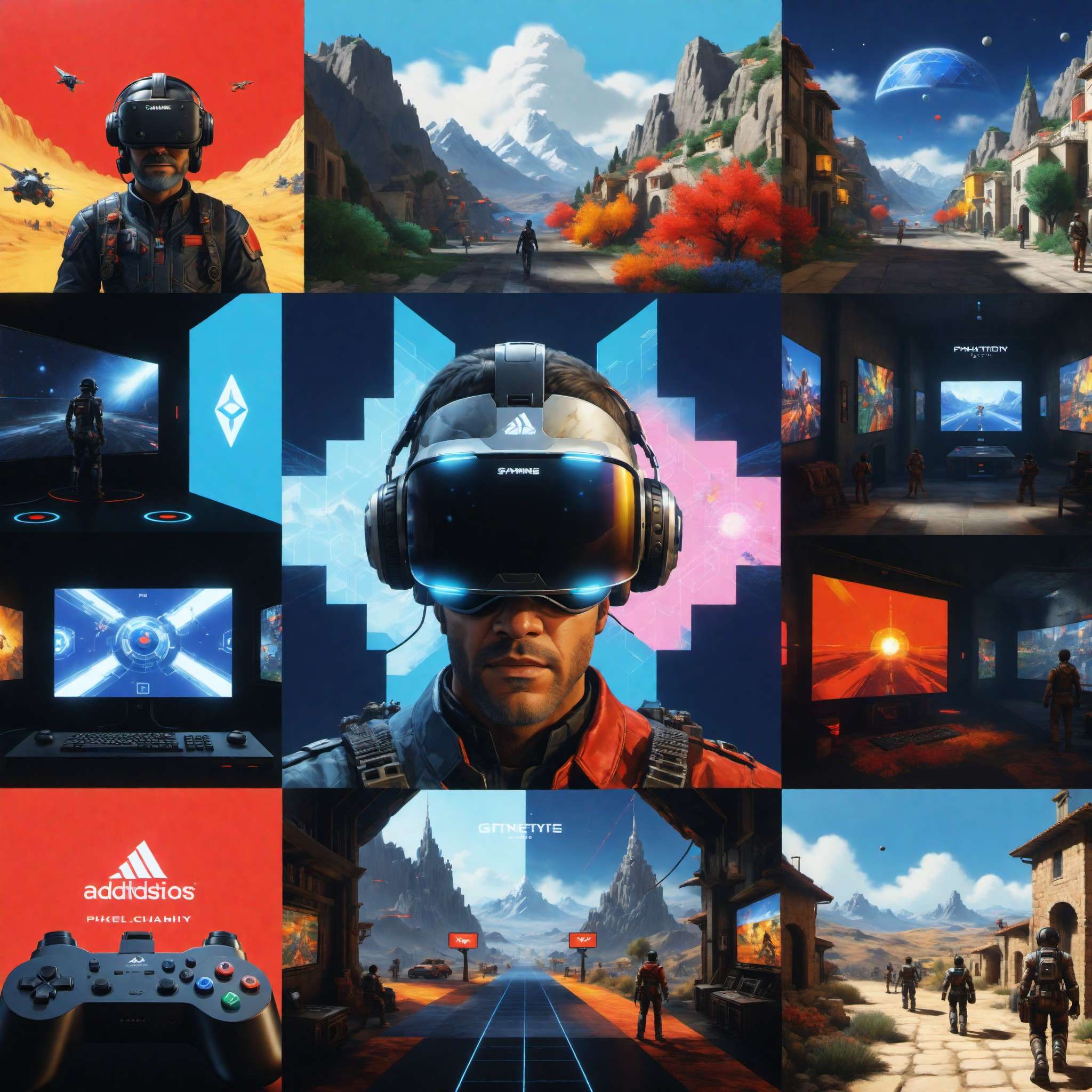
© Copyright , ZombieBunny.Org
Early stages of AI in games
The application of AI in PC gaming can be traced back to the late 20th century, when games were simple, pixelated, and largely text-based. In these early stages, AI was rudimentary, primarily used to control non-playable characters (NPCs) and create basic game mechanics. The aim was to provide a semblance of competition and challenge for the player, even in the absence of human opponents. Classic games like Pong and Pac-Man are notable examples from this era, where AI was utilized to control the movement of the in-game adversaries, creating a competitive gameplay environment.
As PC gaming advanced into the era of 2D platform games and early 3D games, AI started playing a more sophisticated role. Games like Super Mario Bros and The Legend of Zelda used AI to control character behaviors and manage game environments. Despite being basic by today’s standards, the AI in these games was revolutionary for its time. It was able to respond to player actions, albeit in a very simplistic way, and laid the foundation for more complex AI systems in future games. These early uses of AI in gaming set the stage for the more advanced and immersive applications of AI that we see in modern PC games. As technology evolved, so did the capabilities of AI, transforming the gaming experience in ways that were unimaginable in the early days of PC gaming.
Improvements over the years
Over the years, the application of AI in PC gaming has seen substantial advancements. The turn of the new millennium witnessed a shift towards more dynamic and intelligent game design. These improvements were largely driven by advances in machine learning and neural networks, allowing AI to learn from and adapt to player behavior in real-time. Games like Half-Life and Halo were notable for their AI-controlled enemies that could react to player actions, making the gameplay more challenging and engaging.
As technology progressed, AI started to play an even more integral role in shaping the gaming experience. It was used to generate dynamic game environments, adjust game difficulty in response to player performance, and even create game content. This was a significant leap from the early days of AI, where its role was largely confined to controlling NPCs and creating basic game mechanics.
Moreover, advancements in processing power and data handling capabilities have enabled the development of more complex and realistic AI systems. These systems can handle vast amounts of data, learn from it, and use it to create more immersive and realistic gaming experiences. For instance, in modern games like The Witcher 3 and Red Dead Redemption 2, AI is used to create highly detailed and dynamic game worlds, where every NPC has its own routine, adding a level of realism and immersion that was previously unimaginable. These improvements over the years underscore the transformative role of AI in PC gaming.
Present-day sophistication of AI
Today, the sophistication of AI in PC gaming is truly remarkable. Modern games leverage AI to create dynamic environments, realistic non-playable characters, and adaptive gameplay that reacts to the player’s actions. AI systems utilize machine learning algorithms to learn from player behavior, improving the gaming experience over time. This level of sophistication is evident in games like The Last of Us Part II, where AI-controlled characters exhibit complex behaviors and strategies, making the gameplay unpredictable and engaging.
AI is also instrumental in the realm of procedural content generation in modern games. Games like Minecraft and No Man’s Sky utilize AI to create vast, intricate, and unique game worlds. These worlds evolve and change based on player actions, providing a dynamic and immersive gaming experience.
AI’s sophistication extends to multiplayer gaming as well. AI is used to facilitate matchmaking, ensuring players of similar skill levels are paired together for a balanced and competitive gameplay experience. In games with large player bases, AI is also used to monitor and moderate player behavior, ensuring a safe and enjoyable gaming environment.
Moreover, AI’s role in creating realistic physics and lighting effects in games cannot be understated. Games like Battlefield and Crysis are known for their realistic physics and lighting effects, powered by sophisticated AI systems. In essence, the present-day sophistication of AI in PC gaming has transformed the way games are designed, played, and experienced, setting the stage for the future of the gaming industry.
AI: Enhancing Game Realism and Immersion

© Copyright , ZombieBunny.Org
How AI contributes to game realism
AI plays a transformative role in enhancing the realism of PC games, creating experiences that are more immersive and engaging than ever before. One of the ways AI contributes to game realism is through the creation of dynamic and adaptive environments. Modern games leverage AI to generate realistic weather patterns, day-night cycles, and changes in the environment based on player actions. This level of detail adds depth to the game world and enhances the sense of immersion for players.
Another significant contribution of AI to game realism is the creation of intelligent and lifelike non-playable characters (NPCs). These NPCs can learn from and adapt to player actions, exhibit complex behaviors, and even show emotions, making the gameplay more unpredictable and engaging. Games like Red Dead Redemption 2 and The Last of Us Part II are known for their realistic NPCs, which add a layer of depth and realism to the game world.
AI also plays a crucial role in creating realistic physics in games. Sophisticated AI systems can simulate real-world physics, creating believable movements, collisions, and reactions. This is particularly evident in racing and sports games, where realistic physics is critical for an immersive gameplay experience.
Moreover, AI contributes to game realism through the creation of realistic soundscapes. AI can generate adaptive audio based on the game environment and player actions, adding another layer of immersion. In essence, AI has become a key factor in enhancing game realism, transforming the way games are designed and experienced.
Examples of immersive AI-based games
Several games stand out as compelling examples of how AI contributes to immersive gaming experiences. Take, for instance, “Red Dead Redemption 2,” a game praised for its realistic NPCs and dynamic environments. This game utilizes AI to create a living, breathing world, where every character has a unique set of behaviors and routines, enhancing the player’s sense of immersion.
Another notable example is “The Last of Us Part II,” where AI is used to create intelligent enemies that can strategize and adapt to the player’s actions. The game’s AI also contributes to the realism of the game world, generating realistic weather patterns and changes in the environment based on the unfolding narrative.
In the realm of procedural content generation, “No Man’s Sky” stands out. This game uses AI to create a nearly infinite number of unique planets for players to explore, each with its own ecosystem, weather patterns, and wildlife. The game world is dynamic and ever-evolving, offering a unique experience with each playthrough.
“Battlefield V” is another game where AI significantly enhances the realism of the game. The game’s AI system simulates realistic physics, creating believable movements, collisions, and reactions. This is particularly evident in the game’s destructible environments, where buildings crumble and landscapes change in response to the player’s actions.
These games exemplify how AI is being leveraged to create immersive and realistic gaming experiences, setting a new benchmark for the PC gaming industry.
The future of gaming immersion with AI
The future of gaming immersion with AI holds immense potential. As AI technology continues to evolve, we can expect to see even more realistic and dynamic game environments. Games of the future might feature AI-generated worlds that are indistinguishable from real-world environments, complete with lifelike weather patterns, day-night cycles, and ecosystems.
AI is also expected to revolutionize the way non-playable characters (NPCs) behave in games. Future games might feature NPCs that can learn, adapt, and evolve over time, exhibiting behaviors that are as complex and unpredictable as those of real people. This could result in games that offer a different experience every time they are played, with NPCs and game environments that evolve and change based on player actions.
Moreover, the future might see the integration of AI with other emerging technologies like virtual reality (VR) and augmented reality (AR), taking gaming immersion to a whole new level. Imagine playing a VR game where the game world is as detailed and lifelike as the real world, or an AR game where AI-generated characters can interact with the real world in real-time.
Furthermore, AI might play a crucial role in creating adaptive audio in future games. AI could generate sound effects and music that adapt to the game environment and player actions, adding another layer of immersion to the gaming experience.
In essence, the future of gaming immersion with AI looks promising, and as the technology continues to evolve, it is set to transform the PC gaming landscape in ways we can only begin to imagine.
The Role of AI in Game Character Behavior
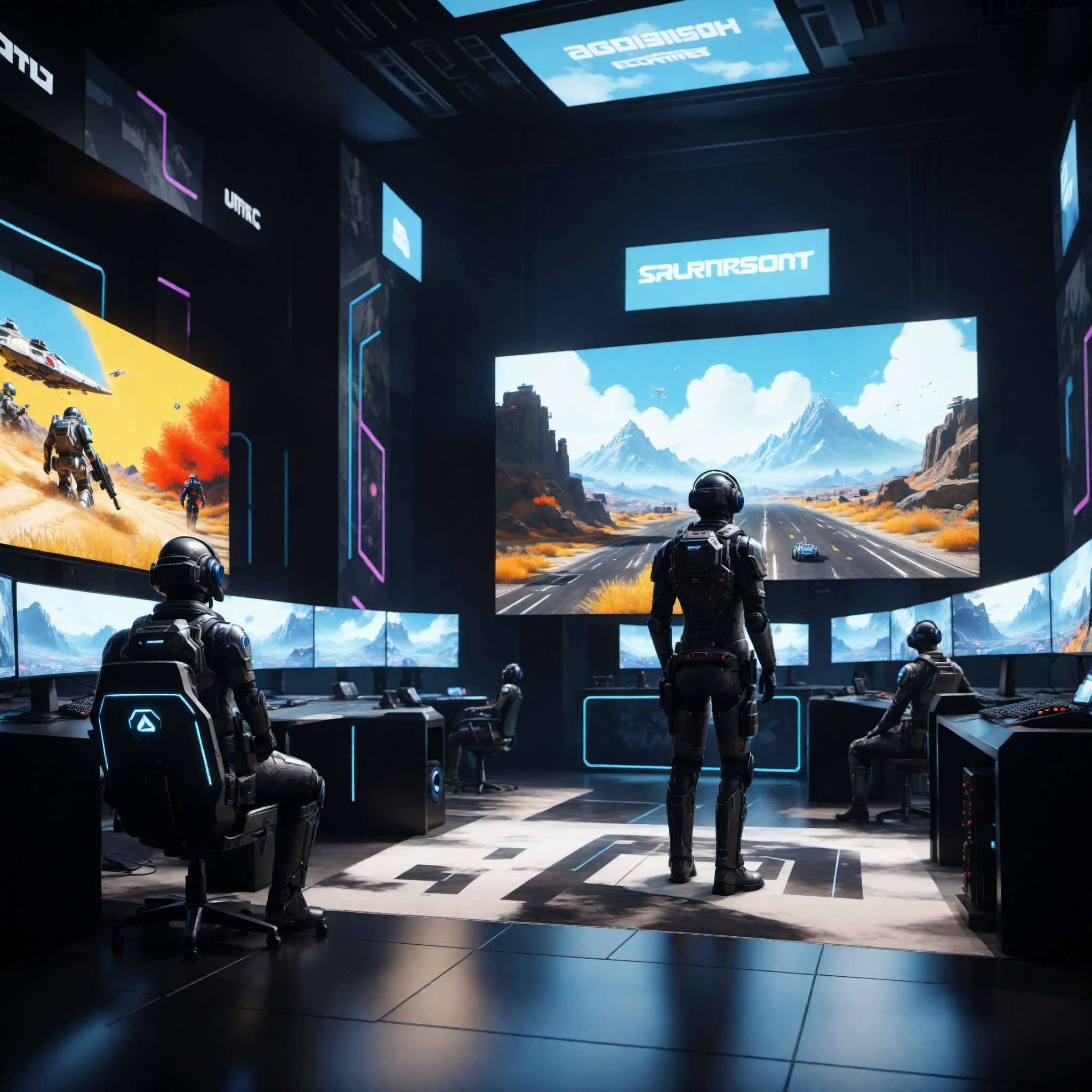
© Copyright , ZombieBunny.Org
Importance of character behavior in games
Character behavior plays a pivotal role in shaping the immersive experience in PC games. The actions, reactions, and interactions of game characters can significantly impact the player’s engagement and overall gaming experience. When characters behave realistically, they add depth to the game world, making it more believable and immersive.
From the early days of PC gaming, character behavior was typically scripted, following a predefined set of rules. However, with the advent of AI, the potential for character behavior in games has expanded exponentially. AI allows for dynamic character behavior, where characters can learn from and adapt to player actions and game environments. This means that characters can exhibit different behaviors each time a game is played, adding an element of unpredictability and replayability to games.
Moreover, realistic character behavior can enhance the storytelling aspect of games. Characters that react and behave realistically can evoke emotional responses from players, making them more invested in the game’s narrative. Games like The Last of Us and Red Dead Redemption 2 are known for their emotionally engaging narratives, which are largely driven by the realistic behavior of their characters.
In essence, character behavior is a crucial aspect of PC gaming that contributes to the realism, immersion, and emotional engagement of games. With AI, the potential for character behavior in games is vast, promising more immersive and engaging gaming experiences in the future.
How AI shapes character behavior
AI plays a transformative role in shaping character behavior in PC games. It allows for the creation of dynamic and intelligent characters that can learn from and adapt to player actions and game environments. This is a significant leap from the early days of gaming, where character behavior was largely scripted and predictable.
AI systems utilize machine learning algorithms to analyze player behavior and make decisions based on this data. This means that characters can change their behavior based on the actions of the player. For instance, if a player consistently uses a particular strategy in a game, AI-controlled characters can learn this strategy and adapt their behavior to counter it. This results in a more challenging and engaging gameplay experience.
Moreover, AI enables the creation of characters that can exhibit complex behaviors and emotions. Characters can show fear, aggression, curiosity, and other emotions based on the situation, making them more lifelike and believable. Games like Detroit: Become Human and The Witcher 3 are known for their AI-controlled characters that exhibit a wide range of emotions and behaviors.
AI also enables characters to interact with each other in realistic ways. Characters can form alliances, engage in conflicts, and exhibit other complex social behaviors, adding depth to the game world. In essence, AI has revolutionized character behavior in PC games, enhancing the realism and immersion of the gaming experience.
Impressive examples of AI-controlled character behavior
Several games stand out as impressive examples of AI-controlled character behavior. For instance, “The Last of Us Part II” is lauded for its AI characters that exhibit complex behaviors and strategies. The game’s enemies can coordinate with each other, flank the player, and adapt to the player’s tactics. This level of sophistication in AI character behavior significantly enhances the game’s realism and immersion.
Another notable example is “Red Dead Redemption 2.” In this game, every non-playable character (NPC) has its own routine and can react to the player’s actions in a realistic manner. The NPCs can remember the player’s actions and respond accordingly in future interactions, adding depth to the game world.
In “Alien: Isolation,” the game’s primary antagonist, the Alien, exhibits impressive AI-controlled behavior. The Alien learns from the player’s actions, adapts its hunting strategies, and presents a persistent and unpredictable threat throughout the game. This creates a sense of tension and fear that is central to the game’s immersive experience.
“Shadow of Mordor” is another game where AI significantly enhances character behavior. The game features the Nemesis System, where AI-controlled enemies remember their encounters with the player and evolve based on these encounters. This results in unique player-enemy relationships and dynamic gameplay experiences.
These games highlight the transformative role of AI in shaping character behavior in PC games, enhancing the realism, immersion, and emotional engagement of the gaming experience.
AI and Procedural Content Generation in Games

© Copyright , ZombieBunny.Org
The concept of procedural content generation
Procedural content generation (PCG) is a concept that has revolutionized the way game content is created. In traditional game design, artists and developers manually create all game content, including environments, characters, and objects. While this method allows for a high level of detail and creativity, it can be time-consuming and resource-intensive. This is where PCG and AI come into play.
PCG is a method of creating game content algorithmically, rather than manually. It involves using AI algorithms to generate game content on the fly, based on a set of predefined rules. This can include anything from game levels and environments to characters and objects. The result is a virtually infinite variety of unique and dynamic game content.
The beauty of PCG is that it allows for a level of diversity and scalability that would be impossible to achieve with manual design. It also adds an element of unpredictability to games, as players can never be sure what they will encounter next. This can make games more challenging and replayable, enhancing the overall gaming experience.
Moreover, PCG can adapt to the player’s actions and performance, creating a dynamic and interactive gaming environment. This means that the game can change and evolve based on how the player plays, offering a unique and personalized gaming experience. In essence, PCG, powered by AI, is transforming the way game content is created, making games more diverse, dynamic, and immersive.
Role of AI in procedural content generation
AI plays a crucial role in procedural content generation (PCG) in games. It’s the driving force behind the algorithms that generate diverse and dynamic game content. AI systems utilize machine learning and neural networks to learn from player behavior and adapt the game environment accordingly. This enables the creation of a unique and personalized gaming experience for each player.
One of the main roles of AI in PCG is the generation of game environments. AI can create vast and intricate game worlds that are unique for each playthrough. These game worlds can evolve and change based on player actions, adding an element of unpredictability and replayability to games. Games like Minecraft and No Man’s Sky are notable examples of this, where AI is used to create near-infinite game worlds for players to explore.
AI is also used in PCG to generate game characters. AI algorithms can create a wide variety of unique characters, each with their own behaviors and abilities. This adds depth to the game world and enhances the player’s sense of immersion.
Moreover, AI can generate game objects and items in PCG. This can include anything from weapons and tools to food and resources. The items generated can be unique for each playthrough, adding another layer of unpredictability and diversity to games.
In essence, AI is a game-changer in PCG, enabling the creation of diverse, dynamic, and immersive game content that enhances the overall gaming experience.
Game examples with AI-generated content
Several games stand out as impressive examples of AI-generated content through procedural content generation. “No Man’s Sky” is a prime example, where AI is used to create a virtually infinite universe for players to explore. Each planet in the game is unique, with its own ecosystem, weather patterns, and wildlife, all generated through AI algorithms.
“Minecraft” is another game that leverages AI for content generation. The game world in Minecraft is procedurally generated, creating a unique and diverse environment for each player. The game also uses AI to generate a wide variety of game items, adding an element of unpredictability and replayability.
“Elite Dangerous” is a space exploration game that uses AI to generate its game universe. The game features over 400 billion star systems, each with their own planets, moons, and space stations, all created using AI algorithms. This results in a vast and diverse game world that offers a unique exploration experience.
“Spelunky” is a platform game where each level is procedurally generated using AI. This means that each time a player starts the game, they are faced with a unique set of challenges, enhancing the game’s replay value.
These games highlight the transformative role of AI in procedural content generation, showcasing how AI can be used to create diverse, dynamic, and immersive game content. As AI technology continues to evolve, we can expect to see more games leveraging AI for content generation, further enhancing the gaming experience.
AI and Game Difficulty Scaling
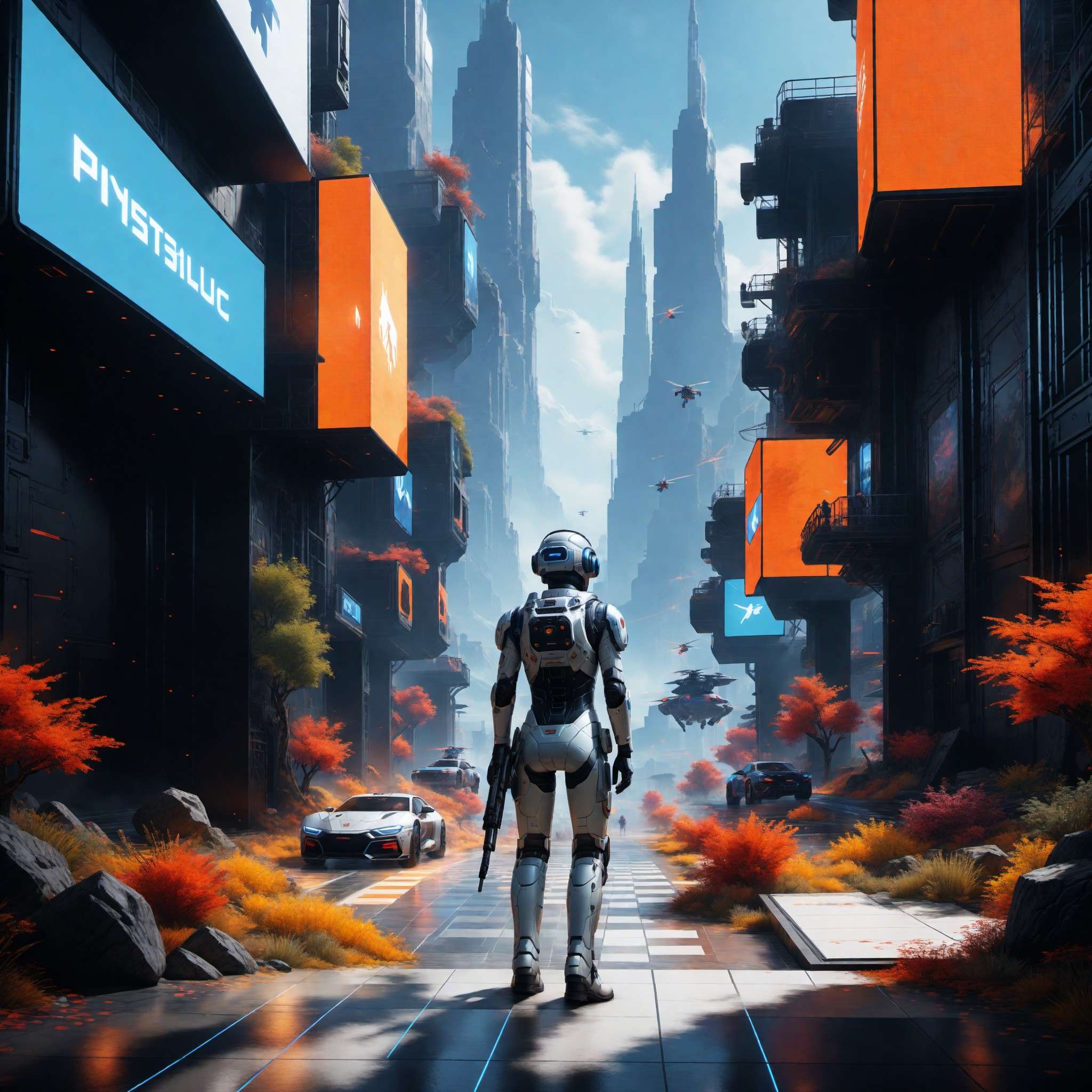
© Copyright , ZombieBunny.Org
The need for game difficulty scaling
Game difficulty scaling is a crucial aspect of modern PC gaming. It refers to the adjustment of game difficulty based on the player’s skill level, ensuring a balanced and engaging gameplay experience. With a broad spectrum of players varying in skill levels, having a one-size-fits-all difficulty level can result in a frustrating experience for beginners and a lackluster challenge for seasoned players. This is where AI comes into play.
AI can analyze player performance and adapt the game difficulty in real-time. If a player is breezing through levels, the AI can ramp up the difficulty to keep the game challenging. Conversely, if a player is struggling, the AI can dial down the difficulty, preventing the game from becoming frustrating.
Difficulty scaling is essential for maintaining player engagement. A game that’s too easy can become boring, while a game that’s too hard can become frustrating. By dynamically adjusting the difficulty, AI ensures that the game remains challenging and engaging for players of all skill levels.
Moreover, difficulty scaling can enhance the replay value of games. When a game adapts to the player’s performance, it offers a unique experience each time it’s played. This can encourage players to replay the game, enhancing its longevity.
In essence, game difficulty scaling is a critical aspect of PC gaming that contributes to the engagement, enjoyment, and replayability of games. With AI, the potential for game difficulty scaling is vast, promising more balanced and personalized gaming experiences.
How AI adapts game difficulty
AI plays a transformative role in adapting game difficulty. It utilizes machine learning algorithms to analyze player behavior and performance, and adjusts the game difficulty in real-time based on this data. This dynamic adjustment of game difficulty ensures that the game remains challenging and engaging for players of all skill levels.
One of the ways AI adapts game difficulty is by analyzing the player’s performance. If the player is performing well, the AI can increase the difficulty by introducing tougher enemies, reducing available resources, or ramping up the complexity of puzzles. Conversely, if the player is struggling, the AI can dial down the difficulty by simplifying puzzles, providing more resources, or decreasing the number of enemies.
AI can also adapt game difficulty based on the player’s play style. If a player prefers a stealthy approach, the AI can make enemies more perceptive, making the stealth approach more challenging. If a player prefers a head-on approach, the AI can make enemies tougher, increasing the challenge of direct combat.
Moreover, AI can adapt the difficulty of specific game elements based on the player’s performance. For instance, in a racing game, if a player is consistently performing poorly on certain tracks, the AI can adjust the difficulty of those tracks to make them more manageable.
In essence, AI has revolutionized the way game difficulty is adapted, creating a more personalized and engaging gaming experience. As AI technology continues to evolve, its role in game difficulty scaling is set to become even more significant.
Impact of AI-based difficulty scaling on gameplay
AI-based difficulty scaling has a profound impact on gameplay. By dynamically adjusting the difficulty based on player performance, AI ensures that the game remains challenging and engaging, enhancing the overall gaming experience.
One of the main impacts of AI-based difficulty scaling is increased player engagement. When a game is too easy, it can become boring. When it’s too hard, it can become frustrating. By maintaining an optimal level of difficulty, AI keeps players invested in the game, enhancing their engagement and enjoyment.
AI-based difficulty scaling also enhances the replay value of games. Since the game adjusts its difficulty based on the player’s performance, it offers a unique experience each time it’s played. This encourages players to replay the game, adding to its longevity.
Moreover, AI-based difficulty scaling can enhance the accessibility of games. By adjusting the difficulty to suit the player’s skill level, AI makes games more accessible to a broader range of players. This means that even beginners can enjoy the game without feeling overwhelmed, while seasoned players can enjoy a challenging experience.
Additionally, AI-based difficulty scaling can add an element of unpredictability to games. The game can introduce new challenges and obstacles based on the player’s performance, keeping the gameplay fresh and exciting.
In essence, AI-based difficulty scaling has a significant impact on gameplay, enhancing the engagement, replayability, accessibility, and unpredictability of games, and ultimately, transforming the gaming experience.
The Impact of AI on Multiplayer Gaming
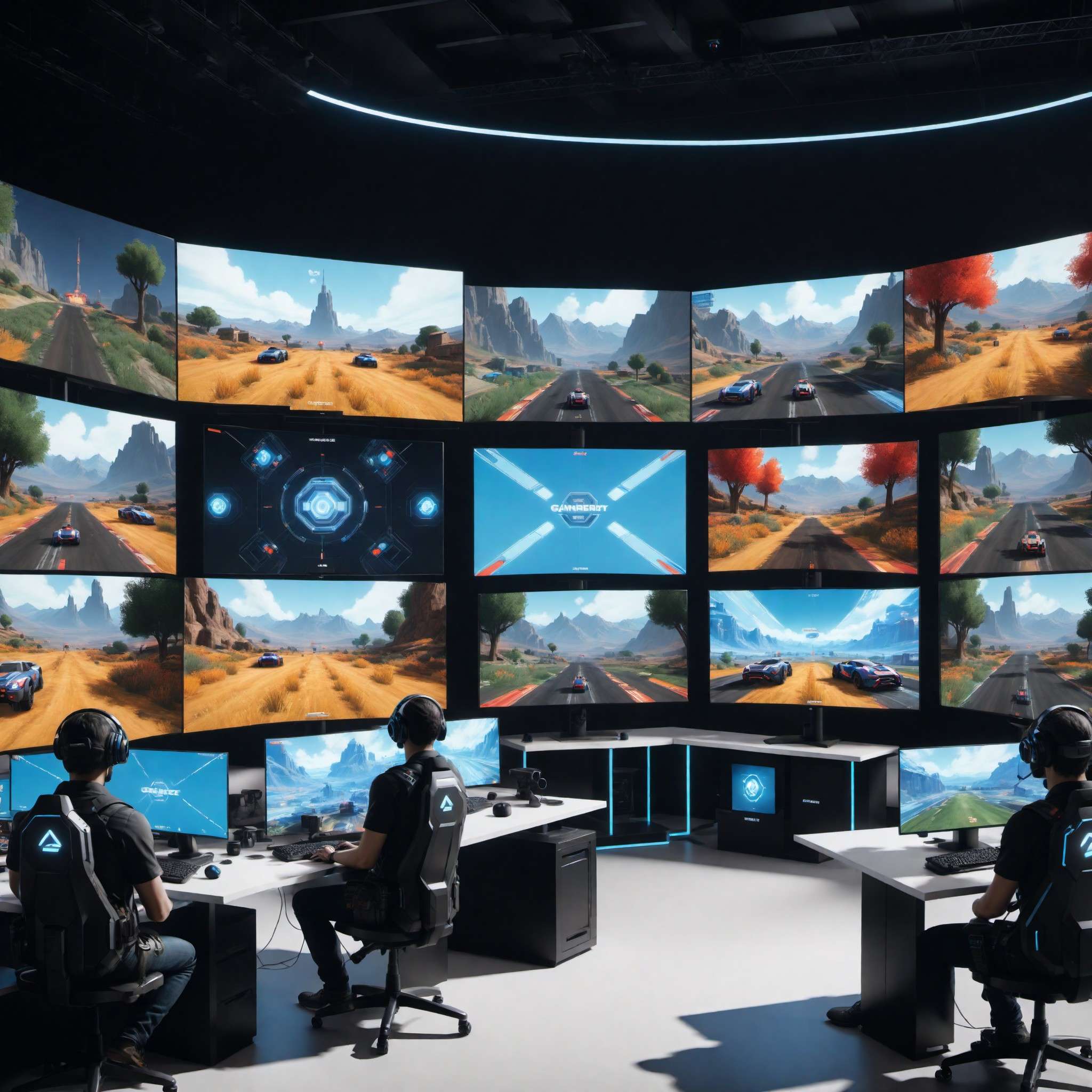
© Copyright , ZombieBunny.Org
The appeal of multiplayer gaming
Multiplayer gaming has become a cornerstone of the PC gaming industry, offering a social and competitive aspect that is appealing to many players. The excitement of competing against or cooperating with other players in real-time adds a level of unpredictability and challenge that is hard to replicate in single-player games.
Multiplayer games offer a platform for social interaction, allowing players to connect with friends or meet new people from around the world. They provide a shared experience where players can work together towards a common goal, compete against each other, or simply enjoy the game world together.
The competitive aspect of multiplayer games is another major draw. Players can test their skills against others, strive to improve, and climb the ranks in competitive modes. This can result in a highly engaging and rewarding gaming experience.
Moreover, multiplayer games offer a level of replayability that is hard to match. With human opponents or teammates, no two matches are ever the same. This unpredictability keeps the gameplay fresh and exciting, encouraging players to come back again and again.
However, to ensure a balanced and fair gameplay experience in multiplayer games, sophisticated systems are needed to match players of similar skill levels and monitor player behavior. This is where AI comes into play, playing a crucial role in enhancing the multiplayer gaming experience. In essence, multiplayer gaming, powered by AI, offers a unique blend of social interaction, competition, and replayability that appeals to a wide range of players.
How AI enhances multiplayer experiences
AI significantly enhances multiplayer gaming experiences in various ways. One of the primary roles of AI in multiplayer gaming is facilitating matchmaking. AI algorithms analyze player performance and behavior to determine their skill level, then match them with players of similar skill levels. This ensures a balanced and competitive gameplay experience.
In games with large player bases, AI is also used to monitor and moderate player behavior. By analyzing chat logs, player reports, and in-game actions, AI can identify and sanction toxic behavior, ensuring a safe and enjoyable gaming environment for all players.
AI can also enhance the multiplayer experience by creating intelligent and adaptive AI-controlled characters. In multiplayer games that involve teams of players against AI opponents, the AI can learn from player strategies and adapt the behavior of AI characters accordingly. This results in a more challenging and engaging gameplay experience.
Moreover, in games where players can drop in and out, AI can take control of player characters when they leave, ensuring the game continues without disruption. This is particularly important in cooperative multiplayer games, where teamwork is crucial.
AI can also facilitate player progression in multiplayer games. By analyzing player performance, AI can provide personalized tips and recommendations to help players improve their skills.
In essence, AI plays a crucial role in enhancing the multiplayer gaming experience, improving matchmaking, moderating player behavior, creating intelligent AI characters, facilitating uninterrupted gameplay, and helping players improve their skills.
Future prospects of AI in multiplayer gaming
The future prospects of AI in multiplayer gaming are immense, promising to transform the multiplayer landscape in exciting and innovative ways. As AI technology continues to evolve, it is set to enhance the multiplayer gaming experience in several key areas.
One of the future prospects of AI in multiplayer gaming is the improvement of matchmaking systems. With advancements in AI and machine learning, we can expect more sophisticated matchmaking algorithms that can better account for player skill, playstyle, and behavior, ensuring more balanced and enjoyable matches.
AI is also set to play a bigger role in moderating player behavior in multiplayer games. With advancements in natural language processing and sentiment analysis, AI systems can become more effective at identifying and sanctioning toxic behavior, ensuring a safer and more inclusive gaming environment.
Furthermore, AI can enhance the behavior of AI-controlled characters in multiplayer games. With improvements in machine learning, AI characters can learn from and adapt to player behavior in more sophisticated ways, making them more challenging and engaging opponents.
Moreover, AI can facilitate more personalized player progression in multiplayer games. By analyzing player performance in more depth, AI can provide more detailed and personalized feedback, helping players improve their skills and strategies.
In essence, the future of AI in multiplayer gaming holds immense promise. As AI technology continues to evolve, it is set to enhance the multiplayer gaming experience in significant and transformative ways.
AI in Gaming: Ethical and Fairness Questions

© Copyright , ZombieBunny.Org
Controversies around AI in games
While AI has revolutionized the gaming industry, it has also sparked several controversies and ethical questions. One major area of contention is around the use of AI bots in multiplayer games. Bots that mimic human players can be used to gain an unfair advantage, disrupting the balance of the game and diminishing the enjoyment for other players. This has led to calls for stricter regulations and controls on the use of AI bots in multiplayer games.
Another controversy is around the use of AI in loot box systems. Some games use AI algorithms to analyze player behavior and adapt loot box contents accordingly. This can create a ‘pay-to-win’ scenario, where players who spend more money have a greater chance of getting rare and powerful items. This has raised concerns about fairness and the potential for exploitation, sparking debates about the need for regulation.
AI moderation in multiplayer games has also been a contentious issue. While AI can help to identify and sanction toxic behavior, there have been instances where AI moderation systems have been overly aggressive or inaccurate, leading to unfair sanctions. This has raised questions about the transparency and accountability of AI moderation systems.
Additionally, the use of AI in procedural content generation has sparked debates about the impact on game design and creativity. While AI can generate diverse and dynamic game content, some argue that it may limit the role of human creativity in game design.
In essence, while AI has many benefits for PC gaming, it also raises several ethical and fairness questions that need to be addressed. As AI continues to evolve and become more integrated into gaming, these questions are set to become increasingly important.
Balancing AI usage and fairness
Balancing the use of AI and maintaining fairness in games is a complex but essential task. As AI becomes more integrated into gaming, it’s crucial to ensure that it’s used in a way that enhances the gaming experience without compromising fairness.
One of the key areas where fairness needs to be ensured is in multiplayer games. AI bots can be used to fill in for human players, but care must be taken to ensure that these bots don’t give an unfair advantage. This requires careful design and regulation to ensure that AI bots mimic human behavior as closely as possible without exceeding human capabilities.
In terms of AI and loot box systems, game developers need to ensure that AI algorithms do not create a pay-to-win scenario. One potential solution is to limit the influence of AI on loot box contents, ensuring that all players have an equal chance of getting rare and powerful items, regardless of how much money they spend.
AI moderation in multiplayer games also needs to be balanced. While AI can help to create a safer and more inclusive gaming environment, it’s important to ensure that AI moderation systems are transparent and accountable. This could involve providing clear guidelines on what constitutes unacceptable behavior and giving players the ability to appeal against sanctions.
In terms of procedural content generation, it’s important to find a balance between AI-generated content and human creativity. While AI can create diverse and dynamic game content, it’s important to ensure that there’s still room for human creativity in game design.
In essence, balancing AI usage and fairness is a complex but essential task. As AI continues to evolve and become more integrated into gaming, it’s crucial to ensure that it’s used in a way that enhances the gaming experience without compromising fairness.
Future solutions for maintaining fairness
As AI continues to evolve and become more integrated into gaming, future solutions for maintaining fairness are set to become increasingly important. One potential solution is the development of more sophisticated AI moderation systems. With advancements in natural language processing and sentiment analysis, these systems could become more accurate and effective at identifying and sanctioning toxic behavior, creating a safer and more inclusive gaming environment.
Another potential solution is the implementation of stricter controls on the use of AI bots in multiplayer games. This could involve developing systems to detect and sanction the use of AI bots that provide an unfair advantage, ensuring a level playing field for all players.
In terms of loot box systems, future solutions could involve limiting the influence of AI on loot box contents. This could be achieved by implementing regulations that ensure all players have an equal chance of getting rare and powerful items, regardless of how much money they spend.
For procedural content generation, finding a balance between AI-generated content and human creativity is crucial. Future solutions could involve developing systems that allow for a greater level of human input and control over AI-generated content, ensuring that there’s still room for creativity in game design.
In essence, as AI continues to evolve and become more integrated into gaming, it’s crucial to develop future solutions that ensure fairness. This will be essential in maintaining the integrity of games and ensuring a balanced and enjoyable gaming experience for all players.
The Future of AI in PC Gaming
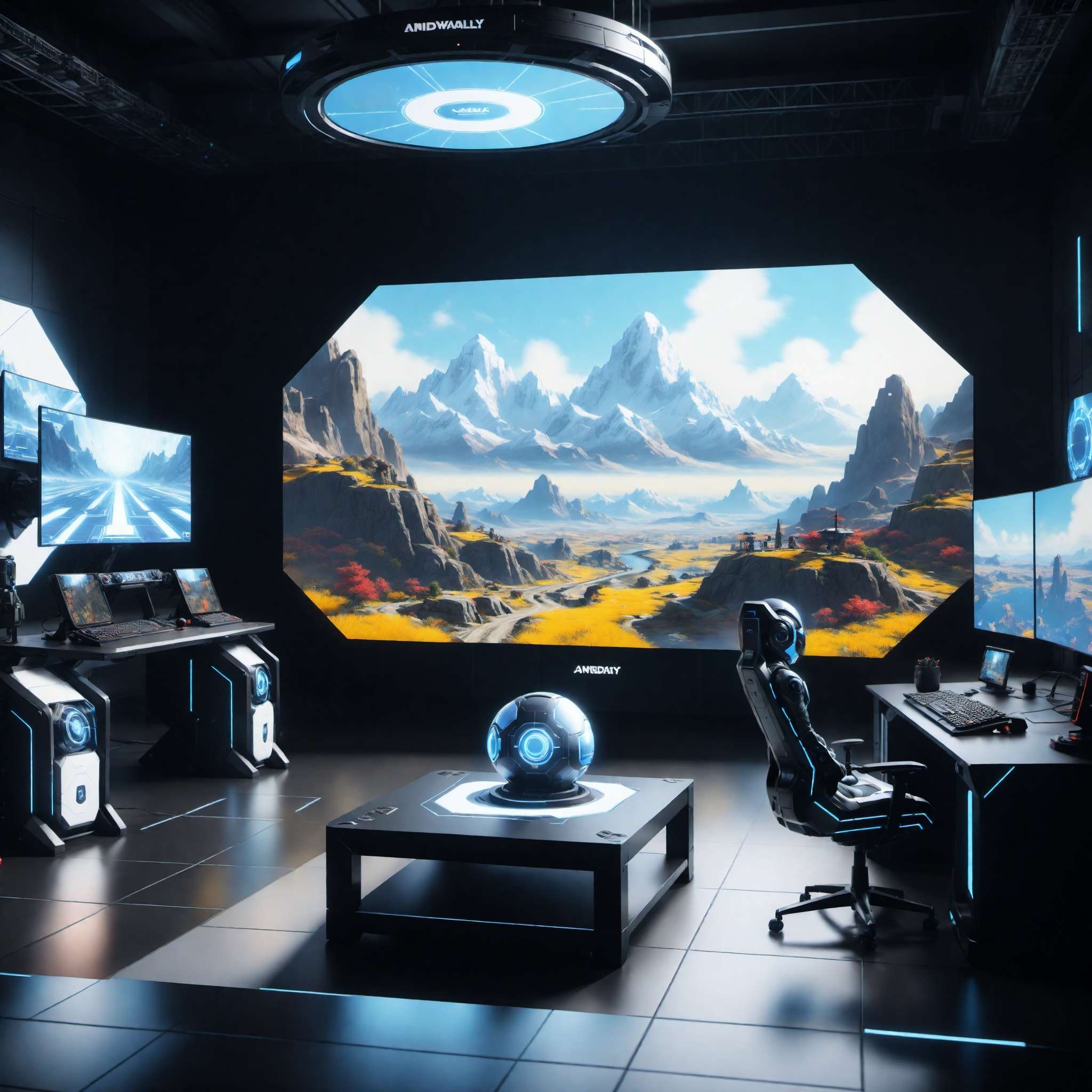
© Copyright , ZombieBunny.Org
Exciting future technologies in gaming
As the gaming industry continues to evolve, several exciting technologies are set to transform the gaming landscape. A key technology is Virtual Reality (VR), which provides immersive gaming experiences that take player immersion to new heights. With advancements in VR technology, we can expect more realistic and engaging VR games in the future.
Another exciting technology is Augmented Reality (AR), which overlays digital content onto the real world, providing a unique blend of reality and gaming. Games like Pokémon Go have shown the potential of AR in gaming, and with advancements in AR technology, we can expect more innovative and immersive AR games in the future.
Cloud gaming is another transformative technology. It allows players to stream games directly from the cloud, eliminating the need for expensive gaming hardware. This makes high-quality gaming more accessible to a wider audience, and with advancements in cloud technology, we can expect improved performance and a greater variety of cloud-based games.
AI is another technology that’s set to transform the future of gaming. With advancements in machine learning and AI algorithms, we can expect more sophisticated AI characters, more dynamic game environments, and more personalized gaming experiences.
Moreover, advancements in haptic technology can enhance the tactile feedback in games, making them more immersive. With haptic technology, players can feel the game, not just see and hear it.
In essence, the future of gaming is set to be transformed by several exciting technologies, promising more immersive, engaging, and personalized gaming experiences.
Predicted advancements in AI for games
The future of AI in gaming holds immense promise, with several predicted advancements set to transform the gaming landscape. One of the major advancements is the development of more sophisticated AI characters. With advancements in machine learning and AI algorithms, we can expect AI characters that are more intelligent, adaptive, and realistic, enhancing the immersion and challenge of games.
Another predicted advancement is the improvement of procedural content generation. With more sophisticated AI algorithms, we can expect more diverse and dynamic game content. This includes more intricate game environments, more varied game items, and more unique game characters, enhancing the diversity and replayability of games.
In terms of multiplayer gaming, advancements in AI are set to improve matchmaking systems, player behavior moderation, and player progression. This includes more accurate matchmaking, more effective moderation of toxic behavior, and more personalized player progression, enhancing the multiplayer gaming experience.
AI is also set to enhance game difficulty scaling. With advancements in AI, we can expect more dynamic and adaptive difficulty scaling, ensuring that games remain challenging and engaging for players of all skill levels.
Moreover, advancements in AI are set to enhance the accessibility of games. By analyzing player behavior and adapting the game to suit the player’s skill level, AI can make games more accessible to a broader range of players.
In essence, the future of AI in gaming holds immense promise, with several predicted advancements set to transform the gaming experience in exciting and innovative ways.
The impact of these advancements on gamers
The predicted advancements in AI for gaming are set to have a profound impact on gamers. The development of more sophisticated AI characters will enhance the immersion and challenge of games, providing gamers with more engaging and realistic gaming experiences.
The improvement of procedural content generation will increase the diversity and replayability of games. Gamers will be able to explore more intricate game environments, interact with more varied game items, and encounter more unique game characters. This will enhance the unpredictability and excitement of games, keeping gamers engaged and encouraging them to replay the game.
In terms of multiplayer gaming, gamers will benefit from more accurate matchmaking, more effective moderation of toxic behavior, and more personalized player progression. This will enhance the balance, safety, and engagement of multiplayer games, providing gamers with a more enjoyable and inclusive gaming experience.
The enhancement of game difficulty scaling will ensure that games remain challenging and engaging for gamers of all skill levels. Whether a beginner or a seasoned player, gamers will enjoy a balanced and challenging gameplay experience that keeps them invested in the game.
Moreover, the enhancement of game accessibility will make games more enjoyable for a broader range of gamers. By adapting the game to suit the player’s skill level, AI can ensure that even beginners can enjoy the game without feeling overwhelmed, while seasoned players can enjoy a challenging experience.
In essence, the predicted advancements in AI for gaming are set to have a profound impact on gamers, enhancing the immersion, diversity, replayability, balance, safety, engagement, and accessibility of games.
Conclusion: Embracing AI for a Superior PC Gaming Experience

© Copyright , ZombieBunny.Org
Recap of AI’s role in enhancing PC gaming
AI has undeniably established itself as a game-changer in the realm of PC gaming. From enhancing the realism of game environments with procedural content generation to adapting game difficulty based on player’s skill level, AI is at the forefront of creating engaging and personalized gaming experiences.
In multiplayer gaming, AI’s role is pivotal in ensuring fair and balanced gameplay. It facilitates sophisticated matchmaking, monitors and moderates player behavior, and even steps in to control player characters when necessary. This ensures a seamless, fair, and enjoyable multiplayer experience for all gamers.
AI has also been instrumental in addressing ethical and fairness concerns in gaming. By monitoring player behavior and adapting game rules, AI ensures a level playing field, fostering a safe and inclusive gaming environment.
As we look to the future, AI continues to push the boundaries of what’s possible in PC gaming. With advancements in machine learning and AI algorithms, we can anticipate more sophisticated AI characters, dynamic game environments, and personalized gaming experiences. Moreover, AI is set to make gaming more accessible, ensuring that games can be enjoyed by a broad spectrum of players.
Embracing AI thus promises a superior PC gaming experience. It is a powerful tool for enhancing the realism, engagement, fairness, and accessibility of games, making it an indispensable part of the future of PC gaming.
Why embracing AI is beneficial for gamers
Embracing AI in PC gaming offers numerous benefits for gamers. First and foremost, AI enhances the realism and immersion of games. By creating adaptive AI characters and dynamic game environments, AI provides gamers with more engaging and realistic gaming experiences. Whether you’re a casual gamer or a hardcore enthusiast, AI can enhance your enjoyment and engagement with games.
In multiplayer gaming, AI ensures a fair and balanced gameplay experience. By facilitating sophisticated matchmaking and moderating player behavior, AI ensures that all players, regardless of their skill level, can enjoy a fair and enjoyable multiplayer experience. This makes multiplayer gaming more inclusive and enjoyable for all gamers.
AI also addresses ethical and fairness concerns in gaming. By monitoring player behavior and adapting game rules, AI ensures a level playing field and a safe gaming environment. This means that gamers can enjoy games without worrying about cheating or toxic behavior.
Looking to the future, embracing AI promises even more benefits for gamers. With advancements in AI technology, we can expect more sophisticated AI characters, more dynamic game environments, and more personalized gaming experiences. Moreover, AI is set to make gaming more accessible, ensuring that games can be enjoyed by a broad spectrum of players, regardless of their skill level or experience.
In essence, embracing AI in PC gaming offers numerous benefits for gamers, enhancing the realism, engagement, fairness, and accessibility of games. It’s an exciting time for PC gaming, and AI is at the heart of it.
Final thoughts on the future of AI in PC gaming
As we stand on the cusp of a new era in PC gaming, AI is undeniably at the heart of it. From procedural content generation to dynamic difficulty scaling, AI has revolutionized the way we play and experience games. It has created more engaging, immersive, and personalized gaming experiences, transforming PC gaming in unprecedented ways.
In multiplayer gaming, AI has been instrumental in ensuring fair and balanced gameplay. By facilitating sophisticated matchmaking, moderating player behavior, and providing seamless gameplay experiences, AI has made multiplayer gaming more inclusive and enjoyable for all players.
However, as AI becomes more integrated into gaming, it also raises important ethical and fairness questions. While AI has made strides in addressing these concerns, it’s crucial to continue to balance AI usage and fairness to maintain the integrity of games and ensure a balanced and enjoyable gaming experience for all players.
Looking to the future, AI holds immense promise. With advancements in AI technology, we can expect more sophisticated AI characters, more dynamic game environments, and more personalized gaming experiences. Moreover, AI is set to make gaming more accessible, ensuring that games can be enjoyed by a broad spectrum of players.
In essence, the future of AI in PC gaming is immensely promising. As we embrace AI, we can look forward to a superior PC gaming experience, characterized by realism, engagement, fairness, and accessibility. It’s an exciting time for PC gaming, and AI is leading the way.
Please support our site and purchase something from our store.







